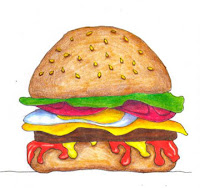For a hamburger today, I will gladly pay you on Tuesday
We all know Wimpy's pitch from the Popeye cartoons. (Thanks to Kevin Staunton for the original imagery.)
Let's say Wimpy gets his hamburger and does, in fact, pay for it on Tuesday. Then he turns around and asks for another one on the same terms. The burger shop is always financing Wimpy one hamburger.
And so it is with Sen. David One Hamburger Behind Hann's logic about school aid shifts.
One Hamburger Behind said in a recent interview on public radio that once you get past the initial shift, the accounting shifts don't mean much, because like the hamburger shop, the schools districts are getting paid for money allocated to them in the past before they are asked to defer current money.
This is all laid out in the Minnesota Public Radio PoliGraph (tm) article at the link. The article labels the claim accurate, but with a caveat. The term of art for "accurate with a caveat" is weasel-y. Why is it weasel-y?
That first hamburger.
Just like Wimpy, the state may be cash flowing its obligation, but it still owes the schools districts for the first hamburger. Or the last hamburger, take you pick, but it is always one hamburger behind.
Wimpy's Hamburger Economics have been the hallmark of budgeting in Minnesota for multiple biennia now. It is really borrowing money to finance current operations. But it's kind of off the books - think Enron - and therefore doesn't have to be counted in figuring out whether we have a state budget that balances.
But it isn't off the books to the school districts who were promised the money would be made up at the time the state took the first hamburger. They have had to cut budgets, cut teachers, cut programs, and borrow money.
Not to mention raise local property taxes. Local school board levy referenda (or referendums, if you prefer) are likely to be popping out this fall.
The tobacco bonds, incidentally, are functionally the same thing: funding current operations out of future revenue streams.
Drawing from here.

No comments:
Post a Comment